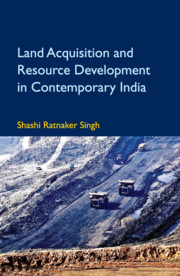Book contents
- Frontmatter
- Contents
- List of Figures
- List of Maps
- List of Tables
- List of Abbreviations
- Foreword
- Acknowledgements
- Part I Theoretical Framework
- 1 Introduction: From Colonial Regime to ‘Welfare State’?
- 2 State, Space and People
- 3 Land, Mines and Minerals
- 4 Land Acquisition and Resource Development in India
- 5 Resource Development and Compensation Issues
- Part II Case Study
- 6 Singrauli: A ‘Space’ of Dependence
- 7 Singrauli: A Development Dilemma
- 8 Administering Singrauli: Governance and Institutions
- 9 Land Acquisition and Its Socio-economic Implications: Field Survey
- Part III Analysis
- 10 Understanding Development
- 11 Conclusion
- Appendix: Memorandum from Mineral-Bearing States
- Bibliography
- Index
2 - State, Space and People
Published online by Cambridge University Press: 16 October 2020
- Frontmatter
- Contents
- List of Figures
- List of Maps
- List of Tables
- List of Abbreviations
- Foreword
- Acknowledgements
- Part I Theoretical Framework
- 1 Introduction: From Colonial Regime to ‘Welfare State’?
- 2 State, Space and People
- 3 Land, Mines and Minerals
- 4 Land Acquisition and Resource Development in India
- 5 Resource Development and Compensation Issues
- Part II Case Study
- 6 Singrauli: A ‘Space’ of Dependence
- 7 Singrauli: A Development Dilemma
- 8 Administering Singrauli: Governance and Institutions
- 9 Land Acquisition and Its Socio-economic Implications: Field Survey
- Part III Analysis
- 10 Understanding Development
- 11 Conclusion
- Appendix: Memorandum from Mineral-Bearing States
- Bibliography
- Index
Summary
Nature of the Indian State
The Indian state has been evolving post colonisation and has maintained its uniqueness as compared to other neighbouring countries. India's approach towards the state-driven nationalization to the state-driven globalization indicates that such strategy requires a greater control over interest groups, for instance, industrialists, trade unions and farmers. To understand the changing nature and role of the Indian state, some of the scholarship on Indian politics is reviewed and reflected in this chapter. The concept of state was not prevalent outside Marxist literature before the advent of political systems theories in the 1950s and the 1960s. The idea of a political system had been developed consciously in the 1950s as a way of avoiding the ambiguities surrounding the term (Easton, 1981). Considering the literature on reflections on the Indian state, this can be divided into two schools: the liberal and the Marxist. However, it would be more fruitful to redraw the lines of division a bit into the following two groups of theories: political–institutional and political–economy perspectives on the Indian state. In the first group would fall theories which focus on the political institutions and processes as the key to understanding the character of public power in India. Political scientists who hold liberal modernist values usually propose these. The second set of theories regard political economy as holding the clue to the nature of the state. From the social sciences viewpoint, such theories are mostly of Marxist persuasion.
Political–Institutional Perspective
The Indian state, as identified by most liberal theorists, is one ruled by the middle class or by the ‘middle sectors’. Myron Weiner, in his studies in the 1950s and the 1960s on Indian politics, contends that the ruling Congress elite represents the middle sectors in urban and rural life, that is, the educated and professional groups, the town merchants and small businessman, and the middle and rich peasantry. He states, ‘The Congress Party today is very much the party of peasant proprietors in the countryside and of businessmen in the towns and cities’ (Weiner, 1967: 488).
- Type
- Chapter
- Information
- Publisher: Cambridge University PressPrint publication year: 2021



